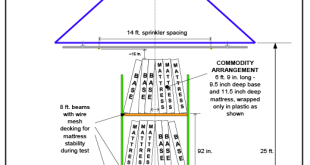Happy New Year! 2024 is going to be an exciting year for the American Fire Sprinkler Association (AFSA) and the standards development process. AFSA has formed a Technical Advisory Council (TAC) to establish AFSA positions on technical changes to the documents that affect the sprinkler industry.
The TAC is comprised of 15 contractor voting members and advisors from ex-officio associate members. This group will propose, discuss, and debate the merits of proposed changes to NFPA standards and direct AFSA representatives on NFPA committees through consensus. The TAC will have representatives from each AFSA region—giving a voice to the entire AFSA membership. Once the roster is finalized and published, feel free to reach out to your regional representative and discuss any issues that the TAC should hear. The first meeting will be held March 19-20 at AFSA headquarters in Richardson, Texas, and the meeting is open to all AFSA members in good standing.
While the number of voting members on the TAC is currently restricted to 15 contractor companies, there are still opportunities for interested AFSA members to participate. Since 2020, AFSA Engineering and Technical Services staff have been accumulating seats on NFPA technical committees (54 committees/44 documents/116 seats) and UL Technical Committees (12 committees). With the establishment of the TAC, it is now time to return those seats to our members under the direction of the TAC. If any member is interested in serving on an NFPA or UL Technical Committee, they should reach out to AFSA staff, and representatives will be appointed through the TAC.
In addition kicking off the TAC, AFSA staff is working on finalizing the 2025 editions of NFPA 13 Standard for the Installation of Sprinkler Systems, NFPA 13R, Standard for the Installation of Sprinkler Systems in Low-Rise Residential Occupancies, NFPA 13D, Standard for the Installation of Sprinkler Systems in One- and Two-Family Dwellings and Manufactured Homes, NFPA 20, Standard for the Installation of Stationary Pumps for Fire Protection; submitting public comments for the second draft of the 2026 edition of NFPA 25, Standard for the Inspection, Testing, and Maintenance of Water-Based Fire Protection Systems; and submitting public inputs for the 2027 edition of NFPA 14, Standard for the Installation of Standpipe and Hose Systems.
The last step in the standard revision process for NFPA 13, NFPA 13R, NFPA 13D, and NFPA 20 is to review the second draft and determine if any revisions need to be changed via a Notice of Intent to Make a Motion (NITMAM). This is the final opportunity to make sure the 2025 editions of these documents are exactly how our membership wants them. For the sprinkler installation standards, there have not been any issues flagged by Engineering and Technical Services staff, but members are encouraged to review the draft documents and notify AFSA staff if there are any changes that you just can’t stomach.
For fire pumps, there is one change that AFSA will likely pursue—horsepower ratings for fire pumps. AFSA submitted proposals at both the first and second draft stages of the revision cycle to change the power requirements for fire pumps from the maximum possible to a more reasonable value of the brake horsepower at 200 percent of the rated flow. The current requirement grossly over-sizes the power requirements for fire pumps. Pumps are only permitted to utilize up to 150 percent capacity for fire protection design, and past that point, the liquid supply could be insufficient, and the motor should not need to run past that point—plus a safety factor. Flows beyond 200 percent are indicative of a catastrophic event that is not within the purview of NFPA 20 to mitigate. The purpose of NFPA 20 is to provide a reasonable degree of protection, and mandating that a fire pump must be indestructible is not reasonable.
The merits of this change will be discussed at the inaugural TAC meeting in March to determine AFSA’s official stance on the matter, and we are extremely excited about the consensus and collaboration this council will foster in the years to come.
ABOUT THE AUTHOR:

Kevin Hall, M.Eng., P.E., ET, CWBSP, PMSFPE, is the senior manager of engineering and technical services for the American Fire Sprinkler Association (AFSA). He is a member of several National Fire Protection Association (NFPA) technical committees responsible for developing the model codes and standards, including, NFPA 1 Fire Code, NFPA 13/13R/13D Installation of Sprinkler Systems, NFPA 20 Installation of Stationary Fire Pumps for Fire Protection, NFPA 25 Inspection, Testing, and Maintenance of Water-Based Fire Protection Systems, and NFPA 200 Hanging, Bracing, and Anchorage of Water-Based Fire Protection Systems. He also represents AFSA on numerous UL technical committees responsible for revising and maintaining the product standards used in the sprinkler industry. He is a registered professional engineer in Delaware and Maryland, NICET III certified in water-based system layout, a certified water-based system professional through NFPA, and a professional member of the Society of Fire Protection Engineers (SFPE). He earned his Bachelor of Science and Master of Engineering degrees from the University of Maryland College Park in fire protection engineering. In 2021, he was recognized as one of SFPE’s “5 Under 35” award recipients. Prior to his association and committee work, he worked for Reliance Fire Protection in Baltimore, Maryland as a project manager overseeing projects of various sizes and complexity.
 Sprinkler Age A Publication of the American Fire Sprinkler Association
Sprinkler Age A Publication of the American Fire Sprinkler Association




